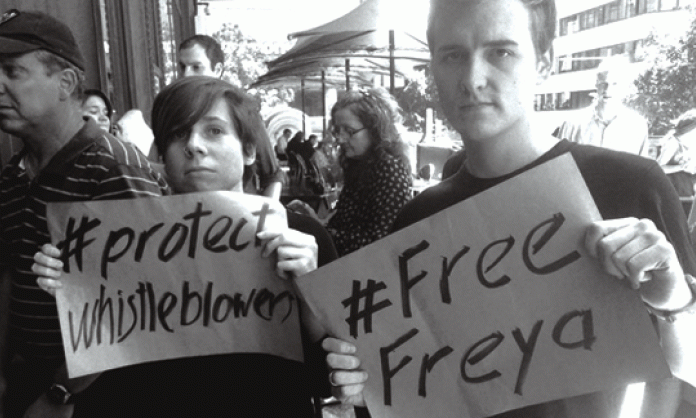Privacy is a privilege belonging only to the powerful. As the protections around most of us are torn down by unrelenting legislative encroachment, two recent court cases highlight that those in power still expect to operate behind a wall of secrecy.
On 23 October at Sydney’s busiest court, the Downing Centre, Freya Newman made her second appearance before a magistrate for the crime of “accessing restricted data”. Newman is a whistleblower. She used her part time job at the Whitehouse Institute to reveal details of a shady scholarship awarded to the prime minister’s daughter, Frances Abbott. Abbott was the first, and last, student awarded the Institute’s previously unknown (although no doubt merit-based) Scholarship for the Daughter of the Liberal leader, worth approximately $60,000.
In a courtroom packed with supporters, Newman’s lawyer explained that his client had been “motivated by a sense of justice”. Such actions, like those of so many others like her, nevertheless put Newman on the wrong side of the criminal law. She will be sentenced in November.
Down the road, at the Federal Court, independent media outlet New Matilda was defending itself from the lawyers of disgraced Sydney University poetry professor Barry Spurr. Spurr, an appointee to Tony Abbott’s school curriculum review, is suing New Matilda for publishing emails containing a series of his racist tirades and sexist slurs. Spurr says that New Matilda has “trashed” his rights as a “private citizen”.
Spurr’s hypocrisy knows no limits. His lawyer even suggested that he was worried that his now public emails contained “sensitive” information about his students and other staff. This is a creative defence from a man who thinks that 95 percent of his students have no right to be at university and sometimes gets a laugh from forwarding emails with identifying student details to friends of his.
Spurr’s lawyer also argued that Spurr was an innocent – “collateral damage” – caught in the middle of a political attack on the federal government. Spurr is as guilty as sin. In reviewing the national English curriculum he railed against its lack of focus on “Western civilisation” and our “Judaeo-Christian heritage”. Spurr’s work backed up the Liberal Party’s conservative agenda to “simplify” the curriculum by wiping references to Aboriginal culture.
An important element of New Matilda’s defence to Spurr’s case are the exemptions in the privacy laws that allow the media to publish private material if it’s in the “public interest”. But the rights of the media to publish leaked information are diminishing.
Tony Abbott’s new anti-terror laws criminalise the disclosure of certain operations carried out by security agencies and the federal police. There are no exemptions for the media. Breaching the laws can mean up to 10 years’ jail for journalists and whistleblowers.
Already whistleblowers like Newman find few protections in law. The federal police are currently investigating 10 aid workers who spoke out about the treatment of refugees locked up in offshore detention centres. The Save Our Children workers are accused of “misuse of official information”.
Everywhere, it is our right to know that is being “trashed”, not the rights of the elite. “Governments and people in power have had a long history of suppression. It’s not new, but I think it is getting worse”, said Chris Graham, editor of New Matilda. “It’s fundamentally about them protecting their own interests, and their own privilege, at society’s expense”, he told Red Flag.
But there are always those who speak out. “Independent media is the future of real journalism, and I think that’s why you see magazines like New Matilda under attack”, says Graham. “We’re not part of the club, and we never will be.”









